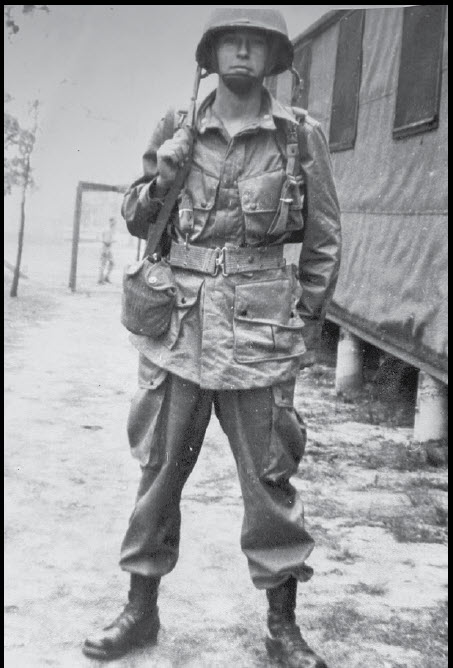By: Ali Elizabeth Turner
When long-time Athens resident Bill Ward was only seven years old, his 19-year-old big brother as well as his hero, James Griffin (J.G.), parachuted into the south of France just weeks after the Normandy invasion. The purpose of the mission was to get Allies into a position where they would create a bottle neck to put the squeeze on the Germans by marching north to meet those who had just been victorious on June 6, 1944, better known as D-Day.
 J.G. also participated in the Battle of the Bulge which, next to Normandy, is considered by many to have been what turned the tide in the war effort in Europe and ultimately brought victory in 1945. He was part of the 517th Paratrooper Infantry Regiment in a war that used the tactic of “jumping out of a perfectly good airplane” for the first time in history. Not only did J.G. parachute, he also fought, and it was something that he never discussed. This was the case for many members of the Greatest Generation when they came home. They “sealed off” the whole experience except perhaps when they were around other battle buddies, and went on to build a life that left the fields of southern France far behind. Corporal J.G. ended up parachuting into five combat zones, including in Holland. He was highly decorated, and was a recipient of the Bronze Star.
J.G. also participated in the Battle of the Bulge which, next to Normandy, is considered by many to have been what turned the tide in the war effort in Europe and ultimately brought victory in 1945. He was part of the 517th Paratrooper Infantry Regiment in a war that used the tactic of “jumping out of a perfectly good airplane” for the first time in history. Not only did J.G. parachute, he also fought, and it was something that he never discussed. This was the case for many members of the Greatest Generation when they came home. They “sealed off” the whole experience except perhaps when they were around other battle buddies, and went on to build a life that left the fields of southern France far behind. Corporal J.G. ended up parachuting into five combat zones, including in Holland. He was highly decorated, and was a recipient of the Bronze Star.
Bill told me that his brother’s life, as it pertained to WWII, was very much like the now iconic 2001 dramatic miniseries, Band of Brothers, and that was about as close as things ever got to a real discussion. Bill said, “I would ask him, and he would laugh and change the subject. Then he would go and see his girlfriend, and I was heartbroken. He was my hero, and I wanted to be around him all the time. I wanted to hear what he did in the war. I was too young to understand what was going on, and it was hard on me.”
J.G. was attending the University of Alabama in 1942 when he was drafted, and told his little brother that he was glad to go and fight for his country. J.G. had always loved everything there was to love about aviation, and so becoming a paratrooper was a natural fit. Of course, no one could have anticipated what it would cost in terms of blood and treasure to liberate Europe from the grip of Hitler, but J.G. never expressed regret regarding what he and others helped to accomplish by marching “north into hell” in what was known as Operation Dragoon.
The original name for Dragoon was Operation Anvil, and it was launched ten weeks after Normandy, on August 15, 1944, and lasted until September 14 of that same year. It was primarily fought by American forces, but there were also French, British, Polish, and Greek troops joining in. The original plan was to launch Dragoon simultaneously with Normandy (also known as Operation Overlord), but it was considered to be too great of a strain on troops and resources to try and do both at the same time. It was also a controversial operation due to the fact that Churchill felt an invasion of the Balkans would better serve to cut off German access to oil, and Eisenhower held fast to the belief that liberating France was necessary for final victory.
Dragoon was a success, and served to set up the Allies for the successful completion of the Battle of the Bulge. It was Hitler’s “last gasp” that to this day remains one of the costliest battle in terms of casualties of the entire war. The Battle of the Bulge lasted from December 16, 1944 to January 28, 1945, and J.G. fought in it as well. Years later he returned to France to pay his respects to those he lost in the war.
J.G’.s Band of Brothers was highly decorated, and considered crucial to the success of the Allies. Among them they received the French Croix de Guerre, Silver Stars, Bronze Stars, Purple Hearts, and a Medal of Honor given to PFC Melvin Biddle. They were known for being light on their feet, able to disrupt operations behind enemy lines, and developing special operations that later became standard to paratrooping in future wars. They were attached to other airborne units at times, including the 82nd, the 13th, and the 17th.
J.G. didn’t marry “the girlfriend,” but did marry a lovely woman named Mary with whom he had four children. He spent his career working in the oil industry, and lived a good, long life. But at the end of the day, he was, and still is, Bill Ward’s big brother and hero, and now you know “the rest of the story.”
By: Ali Elizabeth Turner







